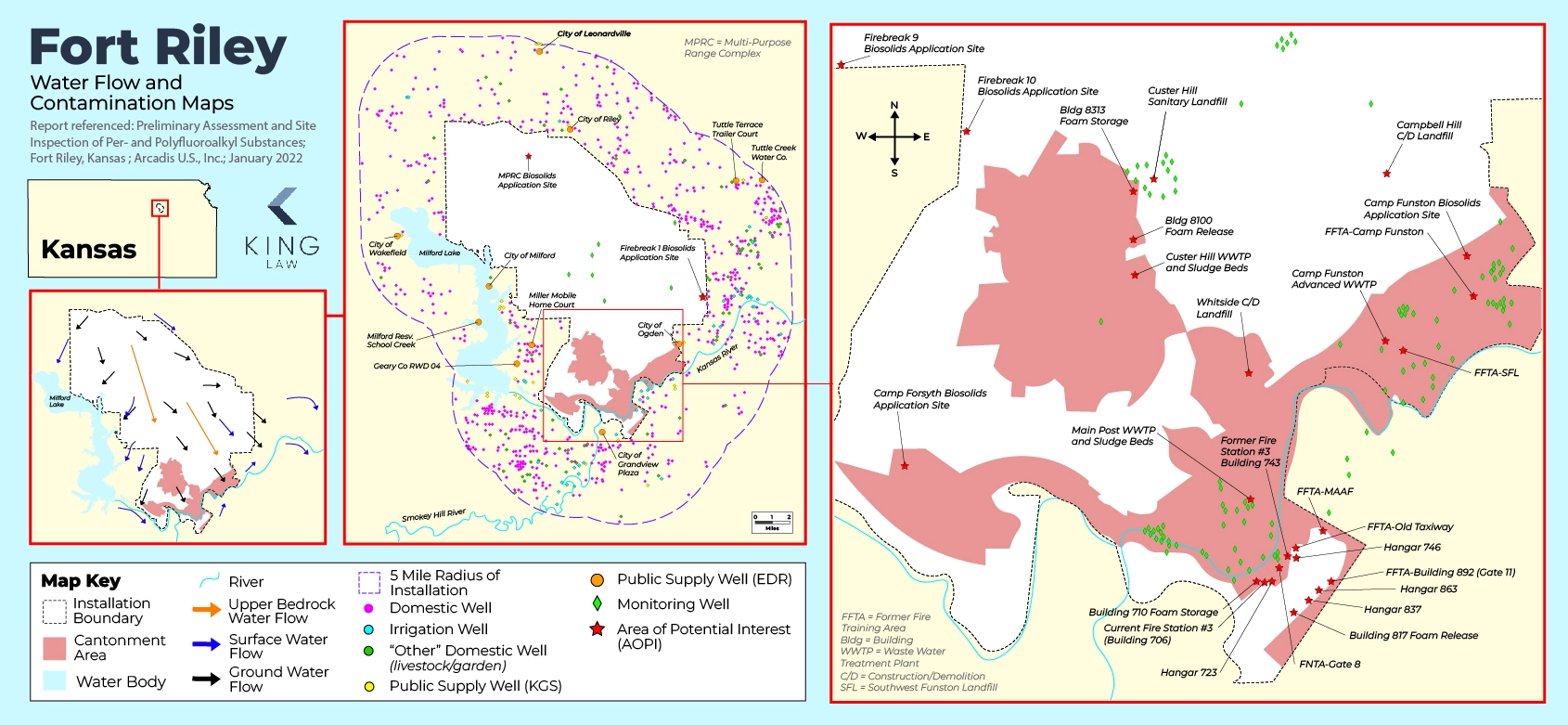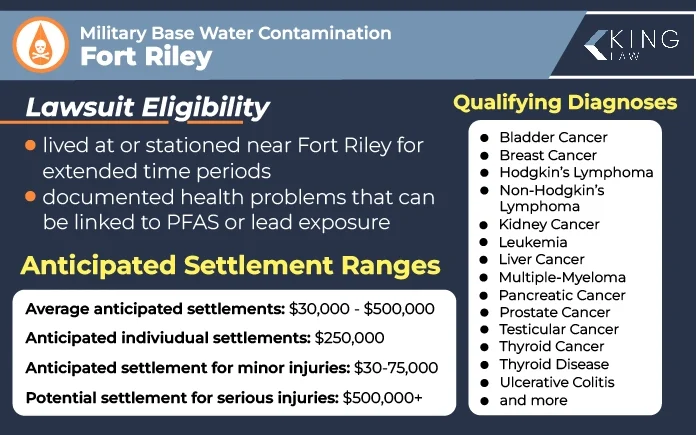
Fort Riley Water Contamination Lawsuit Overview
Fort Riley, home of the 1st Infantry Division, has approximately 15,000 active duty servicemembers. It is located in the Flint Hills Region of Kansas. Established in 1853, the U.S. Army installation has a rich history.
However, recent sampling of the water at Fort Riley indicates that it may be contaminated with toxins. Per- and poly-fluoroalkyl substances, commonly known as PFAS, have been detected in the soil and groundwater at the post. The installation has been designated a Superfund Site by the Environmental Protection Agency and has ongoing cleanup efforts.
If you or a loved one was diagnosed with a PFAS-related illness after serving at Fort Riley, you might be entitled to compensation. At King Law, we have extensive experience helping military members and their families secure financial recovery related to water contamination lawsuits. Contact our office today to schedule a free, no-obligation consultation.
Fort Riley Water Contamination Lawsuit Updates
April 2024: Investigations continue into claims that the water at Fort Riley may be contaminated with toxins, including PFAS, Chloroform, and Volatile organic compounds (VOCs).
March 2023: The Environmental Protection Agency announced a proposed National Primary Drinking Water Regulation (NPDWR) to reduce the maximum contaminant level of PFOA/PFOS to 4 ppt.
September 2022: The fifth five-year review is complete. The Army continues to evaluate whether the implementation and performance of site remedies are effective.
2020: Sampling at Fort Riley found nine locations where the groundwater had PFOA/PFOS above the EPA limits at the time of 70 ppt.
June 1991: A Federal Facility Agreement (Interagency Agreement) is finalized between the Army, the U.S. Environmental Protection Agency, and the Kansas Department of Health and Environment.
October 1990: Fort Riley was added to the National Priorities List due to soil and groundwater contamination.
On this page:
Historical Background of Toxic Exposure at Fort Riley
Fort Riley Water Contamination Map
Contaminants Found in Fort Riley Drinking Water
Water Treatment Efforts at Fort Riley
Health Risks and Symptoms Linked to Drinking Water at Fort Riley
Eligibility Criteria for Fort Riley Water Contamination Lawsuit
Fort Riley Water Contamination Settlement Amounts
How to File a Fort Riley Water Contamination Lawsuit
Statute of Limitations for Fort Riley Water Contamination Cases
Historical Background of Toxic Exposure at Fort Riley
Founded in 1853, U.S. Army Fort Riley has served many purposes throughout its storied history. The installation is home to the 1st Infantry Division, also known as “The Big Red One.” The post serves approximately 15,000 active duty service members and 18,000 of their family members. It also houses tens of thousands of retirees and over 5,000 civilians.
In 1990, the Fort was added to the National Priorities List. It is believed that operations at the installation, including the use of PFAS-containing aqueous film-forming foam (AFFF), resulted in the contamination of the post’s soil, surface water, and groundwater. Subsequent testing confirmed fears that the Fort had water contamination with known toxins that are dangerous to humans and the environment.
While clean-up efforts have been underway since the early 2000s, recent samples indicate that there are still substantial levels of per- and poly-fluoroalkyl substances in the water at the site. PFAS are “forever chemicals” that have been linked to an increased risk of cancer when consumed.
Fort Riley Water Contamination Map

Over the last several years, several areas of Fort Riley were deemed to have some level of soil or groundwater contamination. Those areas include the Southwest Funston Landfill, Pesticide Storage Facilities Area, Dry Cleaning Facility, Former Fire Training Area at Marshall Army Airfield, and Building 354 (Solvent Detection Area).
Contaminants Found in Fort Riley Drinking Water
Several contaminants have been identified in Fort Riley’s drinking water. The most concerning are PFOA (Perfluoroheptanoic acid) and PFOS (Perfluorobutanesulfonic acid). PFOA and PFOS are two of the most commonly studied and detected PFAS.
In 2020, nine locations at Fort Riley had PFOA/PFOS levels above 70 parts per trillion, the threshold concentration issued at the time in a Lifetime Health Advisory by the Environmental Protection Agency (EPA). The EPA has since reduced that threshold to a Proposed Maximum Contaminants Level (MCL) of 4 parts per trillion (ppt) with a Proposed Maximum Contaminant Level Goal (MCLG) of zero.
In July 2023, a sampling of finished drinking water from the site indicated levels of PFOS/PFOA of 3.8 parts per trillion. While below the new enforceable maximum contaminant level of 4 parts per trillion, it is above the goal of zero. Experts suggest that no levels of PFAS are safe for human consumption.
Water Treatment Efforts at Fort Riley
The U.S. Army continues long-term monitoring for multiple sites where contamination was detected in the soil, groundwater, and surface water at Fort Riley. The Army also continues to sample and monitor on-installation drinking water to ensure compliance with the Safe Drinking Water Act.
The Army is currently following the Comprehensive Environmental Response, Compensation and Liability Act (CERCLA) to address PFAS contamination in the groundwater at the post. Remedial investigations at the Fort began in 2022.
Health Risks and Symptoms Linked to Drinking Water at Fort Riley
PFAS exposure has been linked to a number of dangerous health issues, symptoms, and diseases. Prolonged exposure can lead to potentially deadly illnesses, including various types of cancers. If you were stationed at Fort Riley, it is strongly recommended that you receive regular health check-ups and take advantage of any screening programs available to you.
Health risks associated with PFAS exposure:
- Kidney cancer
- Testicular cancer
- Changes to the immune system
- Decreased response to vaccines
- Preeclampsia
- Higher cholesterol
- Elevated liver enzyme levels
- Low birth weight
- Birth defects
- Thyroid disorders
- Kidney disease
- Heart problems
- Fertility issues
Our law firm is currently evaluating cases where individuals have been diagnosed with:
- Bladder Cancer
- Breast Cancer
- Kidney Cancer
- Leukemia
- Liver cancer
- Multiple-Myeloma
- Non-Hodgkin’s Lymphoma
- Pancreatic Cancer
- Prostate Cancer
- Testicular Cancer
- Thyroid Cancer
- Thyroid Disease
- Ulcerative Colitis
If you are diagnosed with a condition related to PFAS exposure after being stationed at Fort Riley in North Central Kansas, you might have a valid claim for compensation. It is strongly recommended that you speak with an attorney as soon as possible.
Eligibility Criteria for Fort Riley Water Contamination Lawsuit
You must meet certain eligibility criteria to file a Fort Riley water contamination lawsuit. The best way to determine if you meet the requirements is to consult with an experienced military base water contamination lawyer. In order to prove your case, you will need to collect evidence such as your military orders and medical records.
Our law firm is currently evaluating cases where individuals have been diagnosed with:
- Bladder Cancer
- Breast Cancer
- Kidney Cancer
- Leukemia
- Liver cancer
- Multiple-Myeloma
- Non-Hodgkin’s Lymphoma
- Pancreatic Cancer
- Prostate Cancer
- Testicular Cancer
- Thyroid Cancer
- Thyroid Disease
- Ulcerative Colitis
Requirements for compensation generally include the ability to prove the duration of exposure, a specific diagnosis, and evidence showing the length of time you worked at or lived on the post. It is important to note that water contamination lawsuits can take anywhere from a few months to a year or more to resolve. Working with an attorney can help ensure you receive the best possible outcome in your case.

Fort Riley Water Contamination Settlement Amounts
Fort Riley water contamination settlement and payout amounts are expected to vary based on the individual circumstances of the case. Influencing factors may include the extent of exposure, duration of residence at the post, and ability to prove a connection between your diagnosis and PFAS exposure.
Anticipated settlement ranges in a Fort Riley water contamination lawsuit:
- Average anticipated settlements: Between $30,000 and $500,000.
- Average anticipated individual settlement: $250,000.
- Average anticipated settlement for minor injuries: $30,000 to $75,000.
- Potential settlement value for serious injuries: $500,000 or more.
While jury awards will typically be larger than individual settlement amounts, a favorable outcome at trial is not guaranteed. It is important to discuss your case with your attorney to determine the best course of legal action.
How to File a Fort Riley Water Contamination Lawsuit
To file a Fort Riley water contamination lawsuit, you need to consult with an attorney. An attorney can help you navigate the legal process, including determining whether you meet the eligibility requirements necessary to file a lawsuit.
Evidence to Support Your Claim:
Water contamination lawsuits are often based on evidence. Evidence is used to substantiate or corroborate your claim.
Evidence that may be needed to support your claim:
- Medical records
- Proof of military service
- Environmental studies
- Water sampling results
- Proof of diagnosis and treatment
- Expert testimony
Statute of Limitations for Fort Riley Water Contamination Cases
All water contamination claims are subject to a state-specific statute of limitations. A statute of limitations is a legal deadline by which a person must file a lawsuit or forfeit their right to compensation.
Time limits can vary substantially based on the individual circumstances of the case. It is imperative to speak to an attorney immediately after a diagnosis to ensure you file a claim within the legal timeframe.
Fort Riley Water Contamination Lawyers
Were you or a loved one diagnosed with cancer or another PFAS-related condition after being stationed at Fort Riley? You may have a valid claim for damages. Contact King Law today to schedule a free, no-obligation consultation. Our lawyers have extensive experience helping servicemembers and their families get the financial recovery they deserve.

